As most teachers and parents know, reading aloud to children and even adolescents is one way to help them learn to appreciate language and associate reading with pleasurable activities such as spending time with loved ones. There is abundant research from experts and testimony from avid readers that being read to at any age reaps benefits in the long run. Listeners have the chance to savor words or phrases while sharing laughter or tender moments with the readers. Sometimes books being read aloud can even offer places to begin difficult conversations. Perhaps now more than ever the human connection provided through sharing favorite stories is essential to ensuring that our society remains literate. This week’s column includes recently selected read-aloud titles ripe for audiences in classrooms, libraries, and homes.
Ages 4–8
The Quickest Kid in Clarksville. Pat Zietlow Miller. Ill. Frank Morrison. 2016. Chronicle.
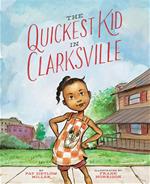 Alta might not have the best of everything, including fancy track shoes, but one thing she knows for sure is that she is fast. In fact, she considers herself the quickest kid in her hometown of Clarksville, TN. But when Charmaine struts down the street in her fancy, brand-new shoes, Alta has a moment of doubt. Still, Alta beats her rival several times until her shoes let her down. As it turns out, the youngsters share the same idol, Wilma Rudolph, whose name Alta repeats for inspiration as she runs. The girls leave their differences behind when they bring a banner to a parade in honor of the Olympic gold medalist, also known for facing down adversity. The discussion of segregation in the back matter adds poignancy to the story and might provide an opening for conversations about racism and social change. Lively illustrations capture the swiftness and determination of the protagonist and the graciousness of Wilma Rudolph as she rides through the city’s streets to acclaim.
Alta might not have the best of everything, including fancy track shoes, but one thing she knows for sure is that she is fast. In fact, she considers herself the quickest kid in her hometown of Clarksville, TN. But when Charmaine struts down the street in her fancy, brand-new shoes, Alta has a moment of doubt. Still, Alta beats her rival several times until her shoes let her down. As it turns out, the youngsters share the same idol, Wilma Rudolph, whose name Alta repeats for inspiration as she runs. The girls leave their differences behind when they bring a banner to a parade in honor of the Olympic gold medalist, also known for facing down adversity. The discussion of segregation in the back matter adds poignancy to the story and might provide an opening for conversations about racism and social change. Lively illustrations capture the swiftness and determination of the protagonist and the graciousness of Wilma Rudolph as she rides through the city’s streets to acclaim.
Tell Me a Tattoo Story. Alison McGhee. Ill. Eliza Wheeler. 2016. Chronicle.
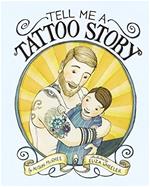 Photographs and illustrations often tell fascinating stories, but in this picture book a father’s tattoos are doing the talking. His son knows there is a well-loved tale behind every tattoo, and he clamors to hear each story again. The father patiently obliges his son’s request and, as it turns out, the first tattoo is from a beloved childhood book read to his father repeatedly by his mother. Others tattoos remind the father of advice from his own father or commemorate milestone moments, including the son’s birth. Readers will appreciate that the father is doing the dishes and hanging out with his son when the story begins as well as the glimpses into his life the tattoos provide. The beautiful illustrations, created with India ink using dip pens and watercolors, provide a road map of one man’s life journey thus far. Perfect for sharing with others because its pages are filled with warm sentiments, the book may prompt readers to wonder what body art the man might add next.
Photographs and illustrations often tell fascinating stories, but in this picture book a father’s tattoos are doing the talking. His son knows there is a well-loved tale behind every tattoo, and he clamors to hear each story again. The father patiently obliges his son’s request and, as it turns out, the first tattoo is from a beloved childhood book read to his father repeatedly by his mother. Others tattoos remind the father of advice from his own father or commemorate milestone moments, including the son’s birth. Readers will appreciate that the father is doing the dishes and hanging out with his son when the story begins as well as the glimpses into his life the tattoos provide. The beautiful illustrations, created with India ink using dip pens and watercolors, provide a road map of one man’s life journey thus far. Perfect for sharing with others because its pages are filled with warm sentiments, the book may prompt readers to wonder what body art the man might add next.
Ages 9–11
Cleo Edison Oliver, Playground Millionaire. Sundee T. Frazier. 2016. Arthur A. Levine/Scholastic.
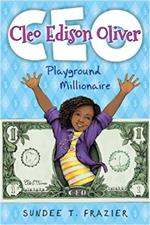 Fifth grader Cleo Edison Oliver, a budding entrepreneur, is smart and determined. If she has her way, it won’t be long until she’s made her first million dollars. After all, she’s carefully following the advice of her idol, television personality Fortune A. Davies, a successful businesswoman. Thus, Cleo sells avocadoes from the family's trees and even invents a nearly painless tooth removal system relying on her little brother's Nerf gun. Often though, despite her best intentions, things go awry. Although she loves her adoptive parents and knows that they love her, she still wonders why her birth mother gave her up, something that comes to mind during the cruel taunts of a classmate. Awash in the drama in her complicated personal life and juggling all her money-making efforts, Cleo disregards the feelings of Caylee, her best friend, who is dealing with unwelcome changes in her own life. The characters here are well drawn, and readers will feel as though they know Cleo and her classmates quite well by the time the book concludes. Despite her character flaws, this up-and-coming CEO is simply irresistible.
Fifth grader Cleo Edison Oliver, a budding entrepreneur, is smart and determined. If she has her way, it won’t be long until she’s made her first million dollars. After all, she’s carefully following the advice of her idol, television personality Fortune A. Davies, a successful businesswoman. Thus, Cleo sells avocadoes from the family's trees and even invents a nearly painless tooth removal system relying on her little brother's Nerf gun. Often though, despite her best intentions, things go awry. Although she loves her adoptive parents and knows that they love her, she still wonders why her birth mother gave her up, something that comes to mind during the cruel taunts of a classmate. Awash in the drama in her complicated personal life and juggling all her money-making efforts, Cleo disregards the feelings of Caylee, her best friend, who is dealing with unwelcome changes in her own life. The characters here are well drawn, and readers will feel as though they know Cleo and her classmates quite well by the time the book concludes. Despite her character flaws, this up-and-coming CEO is simply irresistible.
Mr. Lemoncello’s Library Olympics. Chris Grabenstein. 2016. Random House.
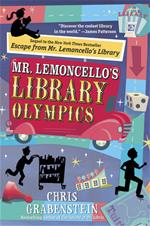 Whenever Luigi Lemoncello is on the scene, fun and games can’t be far behind. This sequel to the popular Escape From Mr. Lemoncello's Library (2013) features most of the team that won the first competition. As Kyle Keeley and his friends bask in the limelight following their victory, Mr. Lemoncello designs a library-skills Olympics. Readers will relate to Kyle's anxiety about losing and wince at some of the gamesmanship that occurs as teams from regions across the nation compete for medals and college scholarships. Sure to be a librarian favorite for sharing because of the high regard with which librarians and their research skills are held in its pages, the book’s puzzles and riddles are fun to solve. The inclusion of a reading list with all the books mentioned in the story solves the problem of what to read next. Clearly, the author and Mr. Lemoncello adore books for the knowledge, entertainment, and pure pleasure they can bring readers. Savvy librarians and teachers will find plenty of inspiration for their own local library Olympics, which might make library skills and book knowledge just as cool as an event in the Summer Olympics. But those games will have to wait while readers—or listeners—get rid of the tears they've shed from laughing and recover from the suspense and surprises in this book.
Whenever Luigi Lemoncello is on the scene, fun and games can’t be far behind. This sequel to the popular Escape From Mr. Lemoncello's Library (2013) features most of the team that won the first competition. As Kyle Keeley and his friends bask in the limelight following their victory, Mr. Lemoncello designs a library-skills Olympics. Readers will relate to Kyle's anxiety about losing and wince at some of the gamesmanship that occurs as teams from regions across the nation compete for medals and college scholarships. Sure to be a librarian favorite for sharing because of the high regard with which librarians and their research skills are held in its pages, the book’s puzzles and riddles are fun to solve. The inclusion of a reading list with all the books mentioned in the story solves the problem of what to read next. Clearly, the author and Mr. Lemoncello adore books for the knowledge, entertainment, and pure pleasure they can bring readers. Savvy librarians and teachers will find plenty of inspiration for their own local library Olympics, which might make library skills and book knowledge just as cool as an event in the Summer Olympics. But those games will have to wait while readers—or listeners—get rid of the tears they've shed from laughing and recover from the suspense and surprises in this book.
Ages 12–14
Booked. Kwame Alexander. 2016. Houghton Mifflin Harcourt.
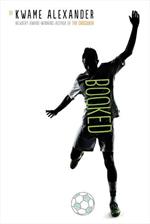 Building on his previous success at engaging readers with a likeable protagonist, the author of The Crossover (2014) places family and soccer front and center in this easily relatable account. Twelve-year-old Nick Hall spends his free time playing soccer with his best friend, Coby Lee, and nursing a crush on April Farrow. But troubles come to the forefront when his parents separate and when he and Coby face harassment and racist comments from two bullies who make the school halls unsafe. Plus, he connects more with his mother, formerly a race horse trainer, than his father, an academic who has written a dictionary filled with strange words. Although Nick is bored by his father’s insistence that he make his way through that dictionary, those weird words find their way into his vocabulary in surprising ways. As it turns out, Nick has a gift for malaprops. As his world spirals off its axis because of an injury, he is supported by word-loving mentors, including his teacher, Ms. Hardwick, and his librarian, Mr. Mac, and discovers that books actually have something to say to him. This novel in verse is filled with rollicking rhymes that make it fun to read. Many listeners may find themselves using some of the odd words such as “sweven” and “yobbery” found on its pages. Although Nick doubts that books and vocabulary might have any charm for him, ultimately he changes his mind. With its double meaning, Booked is an apt title for this novel, which is filled with surprises and is surely a word-lover’s treasure chest.
Building on his previous success at engaging readers with a likeable protagonist, the author of The Crossover (2014) places family and soccer front and center in this easily relatable account. Twelve-year-old Nick Hall spends his free time playing soccer with his best friend, Coby Lee, and nursing a crush on April Farrow. But troubles come to the forefront when his parents separate and when he and Coby face harassment and racist comments from two bullies who make the school halls unsafe. Plus, he connects more with his mother, formerly a race horse trainer, than his father, an academic who has written a dictionary filled with strange words. Although Nick is bored by his father’s insistence that he make his way through that dictionary, those weird words find their way into his vocabulary in surprising ways. As it turns out, Nick has a gift for malaprops. As his world spirals off its axis because of an injury, he is supported by word-loving mentors, including his teacher, Ms. Hardwick, and his librarian, Mr. Mac, and discovers that books actually have something to say to him. This novel in verse is filled with rollicking rhymes that make it fun to read. Many listeners may find themselves using some of the odd words such as “sweven” and “yobbery” found on its pages. Although Nick doubts that books and vocabulary might have any charm for him, ultimately he changes his mind. With its double meaning, Booked is an apt title for this novel, which is filled with surprises and is surely a word-lover’s treasure chest.
Ripple Effect. Sylvia Taekema. 2015. Orca.
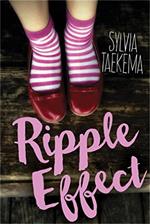 This book from Canada explores a situation with which many students will be familiar. Dana and Janelle are eagerly anticipating sixth grade, but Dana’s nervousness about hospitals prevents her from visiting Janelle while she is hospitalized after an accident. Even after Janelle returns home, Dana can’t find the time to visit her, and their relationship fractures. By the time school starts, Dana seems to have been replaced by the fast-talking and always-there Julia. Dana simply can’t get Janelle alone to apologize and offer an explanation for her behavior. Part of her feels embarrassed that she never visited her friend when she should have while another part of her is resentful that Janelle isn’t there to follow through on their plans. Suddenly, Dana finds herself all alone, without her best friend, doing things by herself that they had planned to do together, and trying to figure out who she is without her best friend. As Dana presses on, she realizes that actions can have ripple effects for good or for bad. Things finally come to a head after the students try out for parts in their class's production of The Wizard of Oz. The story has a solid message with many issues other than friendship being handled carefully.
This book from Canada explores a situation with which many students will be familiar. Dana and Janelle are eagerly anticipating sixth grade, but Dana’s nervousness about hospitals prevents her from visiting Janelle while she is hospitalized after an accident. Even after Janelle returns home, Dana can’t find the time to visit her, and their relationship fractures. By the time school starts, Dana seems to have been replaced by the fast-talking and always-there Julia. Dana simply can’t get Janelle alone to apologize and offer an explanation for her behavior. Part of her feels embarrassed that she never visited her friend when she should have while another part of her is resentful that Janelle isn’t there to follow through on their plans. Suddenly, Dana finds herself all alone, without her best friend, doing things by herself that they had planned to do together, and trying to figure out who she is without her best friend. As Dana presses on, she realizes that actions can have ripple effects for good or for bad. Things finally come to a head after the students try out for parts in their class's production of The Wizard of Oz. The story has a solid message with many issues other than friendship being handled carefully.
Ages 15+
Peas and Carrots. Tanita S. Davis. 2016. Arthur A. Knopf/Random House.
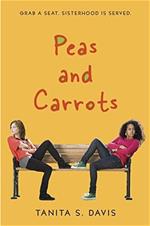 Fifteen-year-olds Dess Matthews and Hope Carter are as different as peas and carrots. After all, Dess (short for Odessa), who has been bounced from one foster placement to another, trusts no one and expects little to go her way. It’s safe to say she has a huge chip on her shoulder. Hope, on the other hand, has been blessed with supportive parents who have enough love in their hearts to take in foster children. Because her young sibling, Austin, lives with the Carters, Dess is placed there while her mother's life is sorted out. Despite her tough veneer and defensiveness, all Dess really wants is a place to call home and a family. Even while Dess and Hope engage in various skirmishes, it's clear that the Carters might have enough room in their hearts for Dess. Because the story is told from alternating points of view, it could be read aloud by two readers, making it easy to sort through all the high school drama to realize that, despite their differences and character flaws, the girls actually have more in common than they thought. This is a refreshingly warm and honest look at what it means to find your way back home, wherever that might be. For those who love strong opening chapters, this book has a humdinger of one that is guaranteed to reel in listeners who will clamor to know what happens next.
Fifteen-year-olds Dess Matthews and Hope Carter are as different as peas and carrots. After all, Dess (short for Odessa), who has been bounced from one foster placement to another, trusts no one and expects little to go her way. It’s safe to say she has a huge chip on her shoulder. Hope, on the other hand, has been blessed with supportive parents who have enough love in their hearts to take in foster children. Because her young sibling, Austin, lives with the Carters, Dess is placed there while her mother's life is sorted out. Despite her tough veneer and defensiveness, all Dess really wants is a place to call home and a family. Even while Dess and Hope engage in various skirmishes, it's clear that the Carters might have enough room in their hearts for Dess. Because the story is told from alternating points of view, it could be read aloud by two readers, making it easy to sort through all the high school drama to realize that, despite their differences and character flaws, the girls actually have more in common than they thought. This is a refreshingly warm and honest look at what it means to find your way back home, wherever that might be. For those who love strong opening chapters, this book has a humdinger of one that is guaranteed to reel in listeners who will clamor to know what happens next.
A Small Madness. Diane Touchell. 2016. Groundwood/House of Anansi.
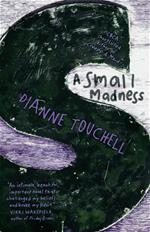 Rose and Michael fall in love and have unprotected sex, and then Rose becomes pregnant. After Michael reacts badly to the news, she tells only one other person, her best friend, Liv. Unsure about what to do, Rose protects herself in the only way she knows how: She pretends the pregnancy isn’t happening. Heavily in denial, she avoids Liv, and treats the pregnancy as though it is a virus she must get rid of, even denying herself food in order to starve her unborn child. Although both Rose and Michael have bright futures, they seem unable to act, and they choose to do nothing as time moves on. While Rose isolates herself from others and continues her delusion, Michael, uncertain about what to do, falls apart, ditches school, and argues with his father. When Rose finally gives birth, they bury the baby nearby. Not surprisingly, the body is discovered by dogs, and the two are hauled in for questioning by the police. The author thrusts readers into the lives of two teens who had resources but failed to use them for various reasons. Clearly, they convinced themselves that if they pretended that everything was OK, it would turn out that way. Inspired by actual events, the book is ideal for sharing aloud because many listeners may see parts of themselves in the main characters, who are unable or unwilling to face the consequences of their actions.
Rose and Michael fall in love and have unprotected sex, and then Rose becomes pregnant. After Michael reacts badly to the news, she tells only one other person, her best friend, Liv. Unsure about what to do, Rose protects herself in the only way she knows how: She pretends the pregnancy isn’t happening. Heavily in denial, she avoids Liv, and treats the pregnancy as though it is a virus she must get rid of, even denying herself food in order to starve her unborn child. Although both Rose and Michael have bright futures, they seem unable to act, and they choose to do nothing as time moves on. While Rose isolates herself from others and continues her delusion, Michael, uncertain about what to do, falls apart, ditches school, and argues with his father. When Rose finally gives birth, they bury the baby nearby. Not surprisingly, the body is discovered by dogs, and the two are hauled in for questioning by the police. The author thrusts readers into the lives of two teens who had resources but failed to use them for various reasons. Clearly, they convinced themselves that if they pretended that everything was OK, it would turn out that way. Inspired by actual events, the book is ideal for sharing aloud because many listeners may see parts of themselves in the main characters, who are unable or unwilling to face the consequences of their actions.
Barbara A. Ward teaches graduate and undergraduate courses in literacy at Washington State University, Pullman. She spent 25 years teaching in the public schools of New Orleans, where she worked with students at every grade level, from kindergarten through high school as well as several ability levels. She is certified in elementary education, English education, and gifted education. She holds a bachelor's in Communications, a master's in English Education from the University of Tennessee and a PhD in Curriculum and Instruction from the University of New Orleans.
These reviews are submitted by members of the International Reading Association's Children's Literature and Reading Special Interest Group (CL/R SIG) and are published weekly on Literacy Daily.